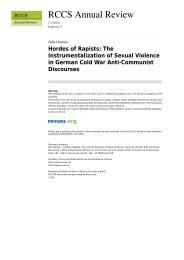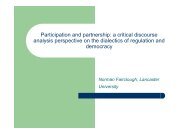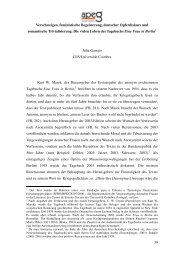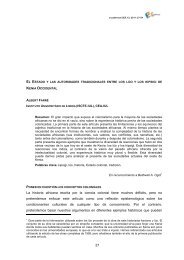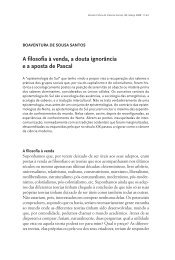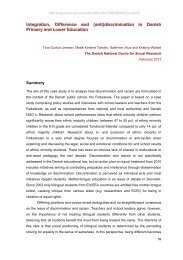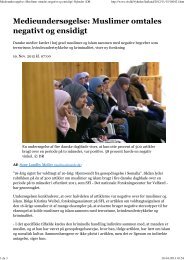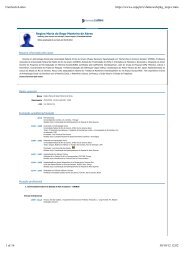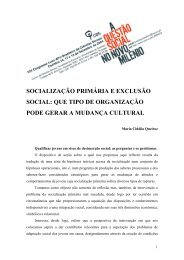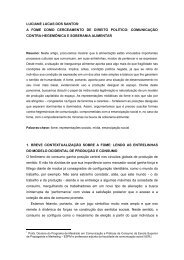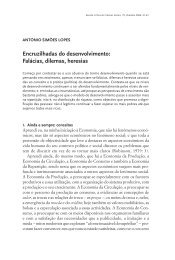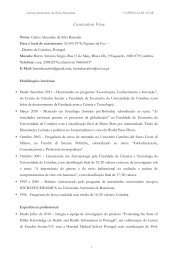Analysis of Integration Policies and Public State-Endorsed ...
Analysis of Integration Policies and Public State-Endorsed ...
Analysis of Integration Policies and Public State-Endorsed ...
You also want an ePaper? Increase the reach of your titles
YUMPU automatically turns print PDFs into web optimized ePapers that Google loves.
Working paper produced within the TOLERACE project<br />
origin within the Labour Market, <strong>and</strong> complaints related to discrimination based on<br />
race, ethnic origin or gender outside the Labour Market. It is free <strong>of</strong> charge to file a<br />
complaint to the Board <strong>of</strong> Equal Treatment. The complaints about discrimination that<br />
the Board deals with are covered by the Act on Ethnic Equal Treatment <strong>and</strong> the Act on<br />
Prohibition <strong>of</strong> Discrimination on the Labour Market.<br />
The Board is composed <strong>of</strong> three judges who compose the presidency <strong>and</strong> nine<br />
members who have a law degree. The Board members are all appointed by the<br />
Minister for Employment, however 3 members are appointed following<br />
recommendation by the Ministry for Refugee, Immigration <strong>and</strong> <strong>Integration</strong> Affairs, 3<br />
other members following recommendation by the Minister for Gender Equality <strong>and</strong> 3<br />
members are directly appointed by the Minister for Employment. The decisions made<br />
by the Board are final <strong>and</strong> binding for both parties. In certain situations, the Board may<br />
decide on a compensation for the victim <strong>of</strong> discrimination (e.g. in case <strong>of</strong> unjustified<br />
dismissal). The Board can also set aside a dismissal unless it is considered<br />
unreasonable to claim the employment relationship maintained or restored.<br />
The Institute for Human Rights is by law m<strong>and</strong>ated to promote equal treatment<br />
<strong>and</strong> fight racism, <strong>and</strong> to work as a specialized body <strong>of</strong> ethnic equal treatment. This<br />
m<strong>and</strong>ate is met by making rapports <strong>and</strong> evaluations, undertaking research,<br />
disseminating information, developing tools for securing equality <strong>and</strong> dealing with<br />
individual complaints about discrimination <strong>of</strong> race or ethnicity. The Institute for Human<br />
Rights can provide assistance to victims <strong>of</strong> discrimination in filing complaints to the<br />
police or to the Board <strong>of</strong> Equal treatment. The Institute for Human Rights has in 2003<br />
with 22 NGO‘s established a cooperation – the Committee for Equal Treatment – that<br />
individually <strong>and</strong> together work for equal treatment <strong>and</strong> against discrimination on the<br />
grounds <strong>of</strong> gender, age, ethnic background, h<strong>and</strong>icaps, religion <strong>and</strong> sexual orientation<br />
in Denmark. In 2007 the committee adopted a statement about the including society,<br />
formulating concerns about discrimination, prejudice, <strong>and</strong> barrier for inclusion in Danish<br />
society <strong>and</strong> the lack <strong>of</strong> laws <strong>and</strong> juridical procedures that protect all individuals against<br />
discrimination.<br />
3.3. Local policies<br />
While there are national laws <strong>and</strong> national institutions (the Board for Equal Treatment<br />
<strong>and</strong> the Institute for Human Rights) to secure <strong>and</strong> try these laws, there are generally no<br />
governmental policies ordering anti-discrimination, racism or pro-tolerance policies or<br />
activities at the local municipal level. The only exception is a government circular from<br />
67



